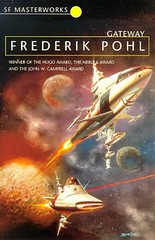Wednesday, December 07, 2005

Title:Gateway
Author: Frederik Pohl
Publisher:Orion
Having colonised Venus, we made a discovery. We were not alone. An alien race had inhabited the planet before us. Managing to launch an alien craft from Venus, we discovered a space station. The space station is full of space ships, which are east to launch, but seemingly impossible to understand or guide. The station is named Gateway, and it becomes a new frontier. Prospectors come to gamble with their lives – some will take a trip into space and return with an artefact or information that will make their fortune, others will die, or never be heard from again.
Bob Broadhead is a food miner – extracting oil in Wyoming, that is converted to food. It is a hard life, and he dreams of going to Gateway and changing his lot. When he wins the lottery he does just that. But when he gets there he finds it is not so easy. The list of the missing and dead is enough to emphasize the risks. But he can’t stay on Gateway indefinitely – sooner or later, he is going to have to take a ship and go out, or admit defeat and return to Earth.
Gateway is the story of Bob Broadhead, the alien Heechee and that which they have left behind. The narrative alternates – switching from sessions in the “present” between Bob and his robot psychiatrist, and flash backs to his journey to Gateway and beyond. From the start we know about the fantastic potential of the alien artefacts, along with a sense of the loves and tragedies of Bob’s life. But Pohl unfolds the picture a snapshot at a time, establishing that Bob has issues, then we learn about Gateway at the same time Bob does, and with each snapshot of Gateway we come closer to understanding how Bob achieved so much, and at what cost.
The base idea behind Gateway is one of the most classic SF paradigms - that of the abandoned alien technology that acts as a catalyst to change humanity. Written in the 1970's we can see those idea repeated later with the likes of Piers Anthony's Kirlian Series, or more recently with Richard Morgan's Takeshi Kovac's novels. Though, for me, the closest comparison I can make is to William Gibson's short story Hinterland. Both focussing on a point in our solar system, from which a ship can launch into the unknown with unpredictable results, and trauma even for the survivors. Of course being a novel, Gateway goes into greater depth - rather than focussing on one encounter, Pohl fleshes out the idea. in fact he creates a kind of meta-fiction in the process - as well as following the progress of those who arrive on Gateway with Bob or the people he meets there, Pohl adds a series of inserts - official Gateway documents, lecture notes, the reports from various trips, letters to the Gateway newspaper, and classified ads that cover the range of requirements or services on offer.
At first, the psychiatric sessions seem to be a distraction from Pohl's story - presenting us with a somewhat obnoxious character, a rich playboy working through the trauma of his shallow inconsequential love life. Through this, it is the material on Gateway that really drives the novel. However as we go on, we get a better understanding of the character - realising what we saw was cover for what really lies within, so that instead of being a distraction this material instead becomes central.
Gateway is a good read, full of classic ideas, and fun with it - for me this was a good introduction to Pohl's writing. Gateway is included in the SF Masterworks series published by Orion.
Comments:
Post a Comment
 this is the voice of re:mote induction.
this is the voice of re:mote induction.